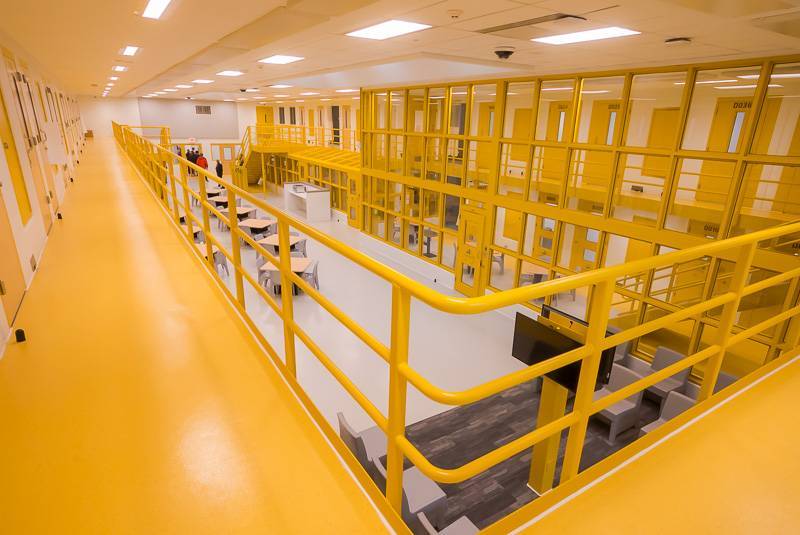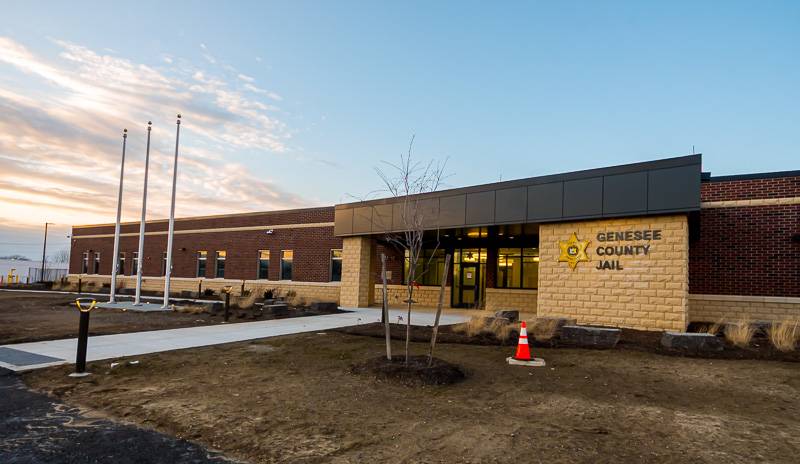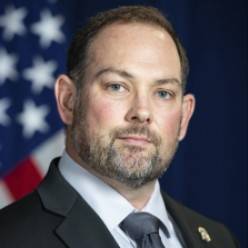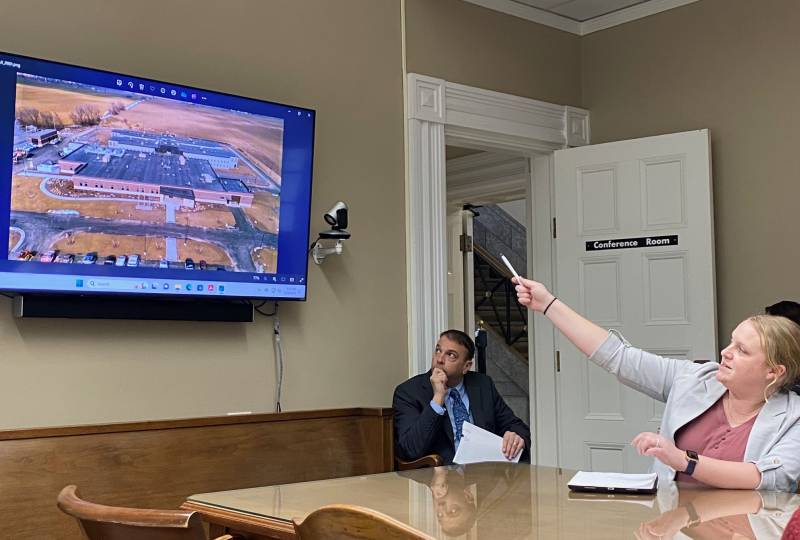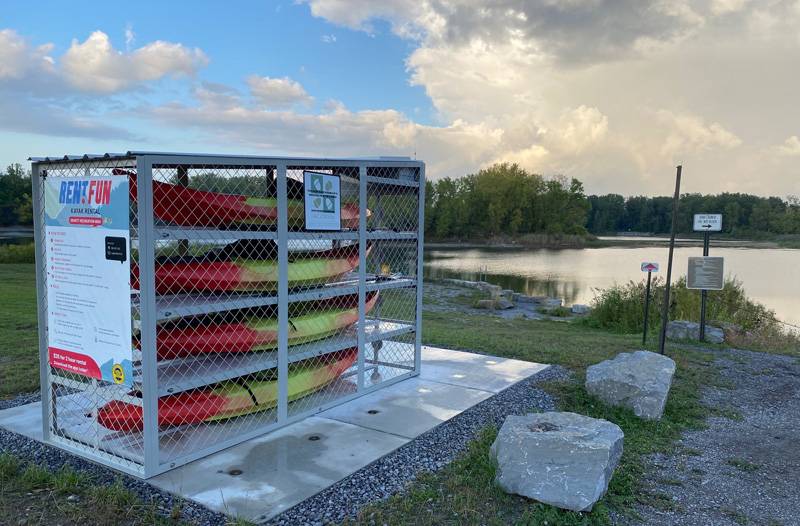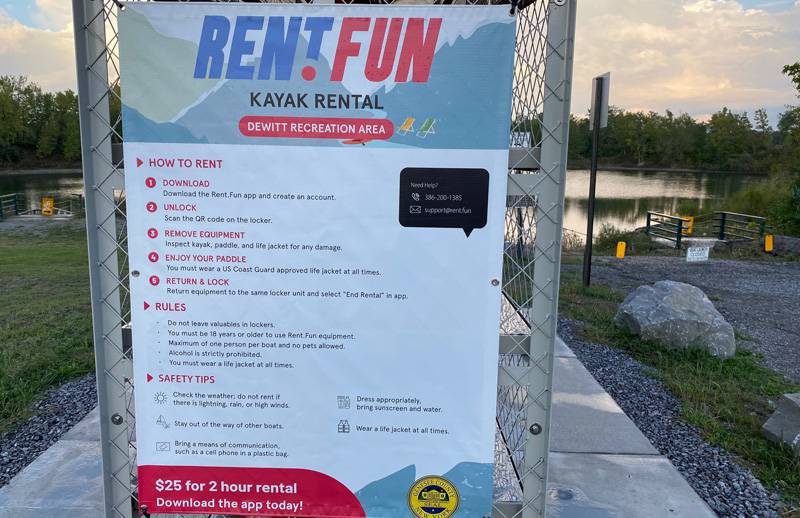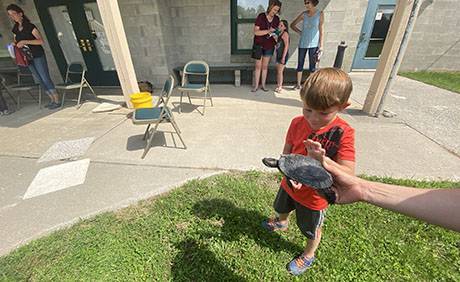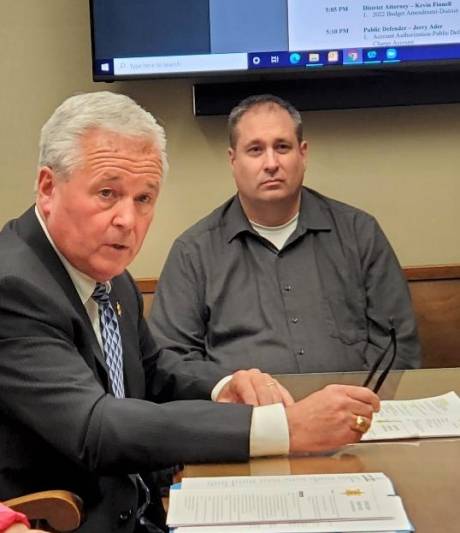The Genesee County Sheriff’s Office will be reassigning its courthouse deputy positions in light of news that the New York State Office of Court Administration will be providing its own security team this summer.
County Sheriff William Sheron shared this during an update of his department today at a meeting of the County Legislature’s Public Service Committee at the Old Courthouse.
“The Office of Court Administration that oversees the (Genesee County) Court Facility … did put us on notice that they're going to have their own private security take over,” Sheron said. “The court security (change) originally was going to be April 1st, but that did not give us enough time for transition so they did agree to July 1st. That means the five court officers -- deputies and sergeant -- will be returning to the sheriff's office and assigned to various duties.”
Sheron said the court positions will be eliminated through attrition.
“Right now, we have two vacancies and we anticipate a third officer will be retiring in July,” he said. “Another officer (will retire) at the end of the year and a third officer, the first part of 2023.”
He said the court sergeant will return to road patrol and be assigned as an administrative sergeant.
“I do need some type of position … to take up some of these administrative duties that just got overwhelming over the last few years with discovery and body cam footage and so forth,” Sheron advised.
The sheriff reported that four deputies will be completing field training next month.
Additionally, two deputies came to the department as lateral transfers from Syracuse and the State Park Police, which will save the office “a little money … as they came to us fully trained,” he said.
Two other deputies are in law enforcement academies, with one in Erie County to be available for duty in December and the other in Niagara County to be available for duty in February 2023.
At least a half-dozen officers are in other types of training, Sheron said.
“We do have a young staff so we have a lot of in-service training for investigators -- anywhere from basic criminal investigations training to evidence collection and interview interrogation,” he said.
Included in that group are the office’s K9 patrol, Sheron said, noting that “both of our canines are doing very well – healthy at this time and are on patrol.”
The Sheriff’s Office school resource officer program is running smoothly, he said, adding that Pavilion Central School District recently voted to go from a 12-month contract to a 10-month contract that will take effect in September.
Sheron said he is having to deal with the excessive amount of time that it takes to deal with certain crimes, especially fraud cases.
“Everything’s requiring a subpoena or search warrant,” he said. “Banks just want more records. It's really taxing on our investigators. I just want to bring that to light because we are seeing more and more and more of this.”
Statistically, deputies are seeing a dramatic increase in the number of warrants served.
“Usually, we have 170 to 190 active warrants at a time. Right now, we’re running 325 to 350,” the sheriff said.
Some more statistics, as of April 1:
- Felony investigations, 71.
- Juvenile investigations, 8.
- Drug task force investigation cases, 10.
- Other investigations (misdemeanors, pistol permit, fatal traffic accidents), 167.
- Items of evidence processed, 312.
- Incidents, 7,799.
- Background investigations, 11.
- Motor vehicle accident reports, 324.
- Motor vehicle accidents, 474.
The Sheriff’s Office oversees seven areas: jail, civil/records, criminal investigations, communications, road patrol (including animal control), Genesee Justice and Justice for Children Advocacy Center.
Department heads reported to the Public Service Committee in the following areas today:
COMMUNICATIONS
Emergency Communications Director Steven Sharpe said his department is having difficulty filling four part-time dispatcher positions, citing qualifications, the “plug-in” nature of the shifts involved and the hourly wage being offered.
“We’ve got people who are on the Civil Service list but they don’t want to take a part-time job,” Sharpe said. “So, they also tie up the list. Part-timers that we do get – who are on the list – we can’t reach them when a full-time position opens. There are other people ahead of them on the list that won’t take the part-time job.”
In an effort to attract young people into emergency dispatch, Sharpe is trying to develop a curriculum at Genesee Community College, but acknowledged that it has yet to take hold.
Sheron also noted that starting pay for a dispatcher is $20.37, less than the $20.50 being offered to overnight stockers at Walmart.
“And it’s not just law enforcement, it’s everywhere,” he said. “We’re going to have to start looking at wages.”
Other communications highlights:
- 2021 calls for service: 76,751 (consisting of 81,107 dispatch events for police, fire and EMS).
- Molasses Hill Tower is complete and was funded by four different NYS Statewide Interoperable Communications Grants. The final acceptance occurred in February.
- The Cedar Street Tower at County Highway department is significantly overloaded and will require replacement due to changing engineering standards. Ice loading requirements have been increased from a half-inch under previous standards to 1-3 inches. Sharpe is seeking budgetary quotes to submit a capital improvement project for 2024 at the latest.
COUNTY JAIL
Jail Superintendent William Zipfel said openings include a senior correction officer, part-time correction officer, registered professional nurse and, as of this month, six correction officers (four to replace the officers assigned to the new jail transition team).
He also said he has been unable to find someone to fill the part-time cook job (paying $17.32 per hour) for quite some time.
Expenses are going up significantly, specifically in the Medicated Assistance Treatment program, food, supplies and energy, Zipfel said.
The MAT program is straining the jail budget due to the fact that prescribed controlled substances, such as suboxone, cannot be returned for refunds and cannot be given to another inmate. They must be destroyed.
People come in and they get prescribed suboxone and methadone and all kinds of controls, and next thing you know, they're released. We can't send those back. We can't use them for anyone else,” he said. “We turn it over to an investigator and they get destroyed. And until somebody decides to do something about this program that says, ‘If I want it, I get it,’ I don’t know what we’re going to do. It just keeps increasing and increasing and increasing.”
Zipfel said the jail’s overtime budget is on the rise, as well, due to the “huge number of hours just for constant watches in the first quarter of this year.”
“I don't see that stopping or going down a lot. We're dealing with sicker population as far as physical and mental issues, and we have to put them on constant watch,” he said, adding that intervention by mental health professionals has helped.
Some jail statistics through the first quarter of 2022:
- Overtime Budget, $112,369.
- Constant Watch and Hospital Hours, 2,118.
- Food Costs/Meal Services, 15,799 meals served; $21,677.06 total cost; $1.3720 cost per meal.
- Average Daily Population, males, 55.6.
- Inmates Boarded Out, females, 30 inmates, $64,300 (not including Wyoming County).
- Inmates Boarded Out, males, 10 inmates, $25,140 (not including Wyoming County).
- Parole and State Readies as a portion of the Average Daily Population, 15.
GENESEE JUSTICE
Program Coordinator Diana Prinzi reported three part-time community service/victim assistants are needed, but the possibility of combining two of the part-time jobs into a full-time position is being considered.
Funding for the department through the Office of Victim Services decreased this year by nearly $14,000, dropping the total to $130,104 – the original funding amount released in 2019.
She said the office is requesting $181,917 per year for the new contract period that runs from Oct. 1, 2022 through Sept. 30, 2025. Department of Criminal Justice Services’ grant funding: has remained the same since 2019.
The agency’s program numbers in the area of Release Under Supervision, Community Service and Victim Assistance are increasing and expected to hit or exceed pre-COVID statistics.
JUSTICE FOR CHILDREN ADVOCACY CENTER
Program Coordinator Theresa Roth said her department is actively recruiting for a supervising clinical social worker, a position that has been vacant since it was created last November.
Last year was the busiest in the history of the JFCAC, she said, with 262 new cases opened, and this year is expected to meet or exceed that number.
A contract with the state Office of Children and Family Services for funding of the agency’s satellite offices in Albion and Warsaw has been renewed through September 2027, she said, noting that having these locations results in signficant savings for Orleans and Wyoming counties.
Roth also reported a “small cut in funding” from the state Office of Victim Services.
That drew the ire of Legislator Marianne Clattenburg, who called it “reprehensible” that the state would not prioritize services for abused children.
Photo at top: Genesee County Sheriff William Sheron reporting to the Public Services Committee this afternoon. Emergency Communications Director Steven Sharpe is in the background. Photo by Mike Pettinella.


